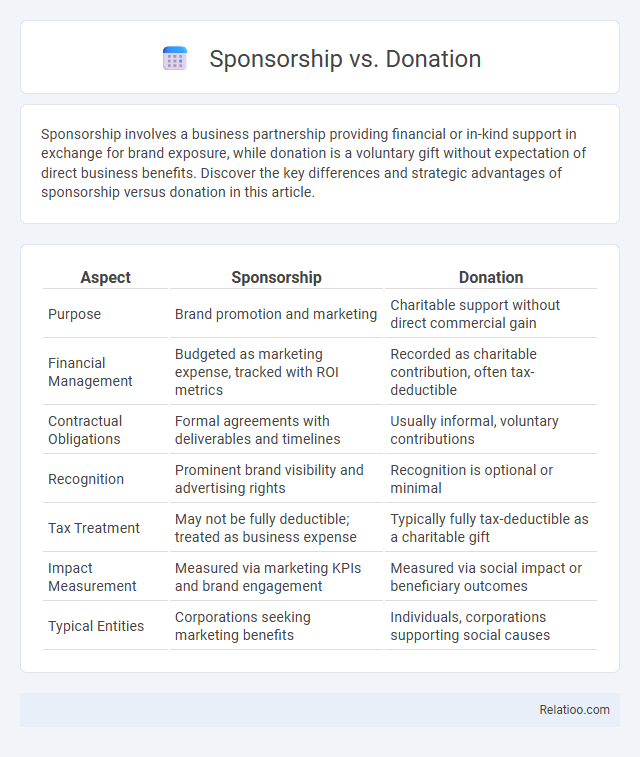Sponsorship involves a business partnership providing financial or in-kind support in exchange for brand exposure, while donation is a voluntary gift without expectation of direct business benefits. Discover the key differences and strategic advantages of sponsorship versus donation in this article.
Table of Comparison
| Aspect | Sponsorship | Donation |
|---|---|---|
| Purpose | Brand promotion and marketing | Charitable support without direct commercial gain |
| Financial Management | Budgeted as marketing expense, tracked with ROI metrics | Recorded as charitable contribution, often tax-deductible |
| Contractual Obligations | Formal agreements with deliverables and timelines | Usually informal, voluntary contributions |
| Recognition | Prominent brand visibility and advertising rights | Recognition is optional or minimal |
| Tax Treatment | May not be fully deductible; treated as business expense | Typically fully tax-deductible as a charitable gift |
| Impact Measurement | Measured via marketing KPIs and brand engagement | Measured via social impact or beneficiary outcomes |
| Typical Entities | Corporations seeking marketing benefits | Individuals, corporations supporting social causes |
Understanding Sponsorship and Donation
Sponsorship involves a business providing financial or in-kind support to an event, organization, or individual in exchange for brand visibility and marketing benefits, making it a strategic investment with measurable returns. Donation is a voluntary gift given without expecting anything in return, often aimed at supporting charitable causes, nonprofits, or individuals in need, reflecting altruism rather than commercial gain. Understanding the distinction between sponsorship and donation highlights the differing objectives: sponsorship seeks brand promotion and audience engagement, while donation prioritizes philanthropy and social impact.
Key Differences Between Sponsorship and Donation
Sponsorship involves a mutual exchange where your brand gains visibility or marketing benefits in return for financial or in-kind support, often linked to events or causes. Donation is a one-way gift without direct marketing benefits, aimed solely at supporting a charitable cause or organization. Understanding these key differences helps you decide whether you want promotional advantages or purely philanthropic involvement.
Objectives of Sponsorship in Marketing
Sponsorship in marketing aims to create brand awareness, enhance corporate image, and directly engage target audiences by associating the brand with events or causes that align with its values. Unlike donations, which are primarily philanthropic and seek to support causes without direct commercial benefit, sponsorships are strategic investments intended to generate measurable marketing returns. Objectives of sponsorship include driving sales, increasing brand loyalty, and differentiating the brand in competitive markets through visibility and experiential marketing opportunities.
The Purpose and Impact of Donations
Donations primarily serve charitable purposes, aiming to support causes such as education, healthcare, or disaster relief, creating direct social impact and fostering community development. Sponsorships, in contrast, involve a business investing in an event or entity for marketing benefits, often gaining brand exposure and audience engagement. Understanding these distinctions highlights that donations focus on altruistic outcomes, while sponsorships blend philanthropy with strategic business objectives.
Benefits of Sponsorship for Businesses
Sponsorship offers businesses targeted brand exposure and effective audience engagement that donations alone may not provide. Your company gains marketing opportunities, enhanced reputation, and measurable returns through strategic partnerships with events or organizations. Unlike general donations, sponsorships create long-term relationships that drive customer loyalty and increase sales.
Tax Implications: Sponsorship vs Donation
Sponsorship and donation differ significantly in tax implications; sponsorship expenses are typically classified as marketing costs and are tax-deductible as business expenses, while donations are often eligible for charitable tax deductions provided they support registered nonprofit organizations. Sponsorships generally require a quid pro quo, such as advertising benefits for the sponsor, which influences their deductibility and reporting, whereas donations are gifts without direct benefits that may qualify for tax credits or deductions under charitable contribution rules. Understanding these distinctions can optimize tax strategies for businesses and individuals aiming to reduce taxable income while supporting causes or promoting brand visibility.
Legal Considerations and Compliance
Sponsorship involves a contractual agreement where sponsors receive promotional benefits, requiring compliance with advertising laws and transparency regulations, whereas donations are typically gifts without direct benefits, subject to charitable contribution laws and tax deduction eligibility. Legal considerations for sponsorship include detailed agreements outlining rights and obligations, adherence to marketing standards, and disclosure requirements under consumer protection laws. Donation compliance focuses on proper documentation, adherence to nonprofit regulations, and ensuring funds are used according to donor intent and applicable tax laws.
Measuring ROI: Sponsorship versus Donation
Sponsorship offers measurable ROI through brand visibility, audience engagement, and direct marketing opportunities linked to specific events or activities, allowing precise tracking of leads, sales, and media impressions. Donations, while enhancing goodwill and corporate social responsibility, typically lack quantifiable financial returns and rely more on long-term reputation impact rather than direct metrics. Businesses seeking clear, data-driven ROI insights prefer sponsorships for their ability to generate immediate, trackable outcomes compared to the more philanthropic, less measurable benefits of donations.
Choosing the Right Approach: Sponsorship or Donation?
Choosing between sponsorship and donation depends on your organization's goals and the intended benefits. Sponsorship involves a business providing financial or material support in exchange for brand exposure and marketing opportunities, enhancing visibility and corporate reputation. Donations are typically altruistic contributions without direct commercial returns, aimed at supporting charitable causes or nonprofit activities, making them ideal for organizations seeking pure philanthropic support.
Real-World Case Studies and Examples
Sponsorship involves a mutually beneficial partnership where businesses provide financial or in-kind support in exchange for brand visibility, as seen in Red Bull's promotion of extreme sports events enhancing its market presence. Donations are philanthropic contributions without direct commercial returns, such as Bill and Melinda Gates Foundation's funding for global health initiatives improving vaccination rates worldwide. Real-world examples highlight how sponsorships drive marketing objectives while donations focus on social impact, with many organizations leveraging both to maximize outreach and effectiveness.

Infographic: Sponsorship vs Donation
 relatioo.com
relatioo.com